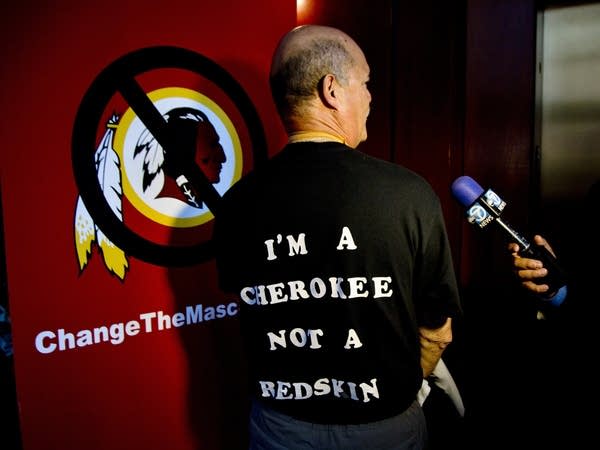New Vikings stadium may give leverage to opponents of 'Redskins' name and logo
Go Deeper.
Create an account or log in to save stories.
Like this?
Thanks for liking this story! We have added it to a list of your favorite stories.

A long-simmering controversy over the name of the Washington, D.C., NFL franchise is heading toward the Twin Cities.
Native American groups and supporters say the construction of a new Minnesota Vikings stadium offers a chance to put new pressure on the NFL to rethink the Washington Redskins name and logo.
Opponents, however, aren't appealing directly to the NFL, the Vikings or the Redskins. Instead, they want the state board building Minnesota's new stadium to ban the word Redskins on publicly owned signs or address systems at the new facility as well as one last time in the Metrodome when Washington plays here Nov 7.

"There are literally a score of federal, state, county, municipal laws in effect that all prohibit the offensive R word, just like the N word, from being used in an environment where the public assembles," said Alan Yelsey, an activist who helped make the request to the Minnesota Sports Facilities Authority.
Turn Up Your Support
MPR News helps you turn down the noise and build shared understanding. Turn up your support for this public resource and keep trusted journalism accessible to all.
Officials didn't take any action on the request before signing a new lease with the Vikings last week, though the stadium authority may have a formal response next week, said spokeswoman Jenn Hathaway.
Opponents of the Redskins name say they'll be at the Metrodome Nov. 7, protesting before the game.
"It's not a fist in the air type of situation," said Richie Plass of the Menominee Nation in northeastern Wisconsin. "It's just education, and to let you know that there are many of us, Native Americans, do not support that name at all."
Supporters got a high-visibility boost last week from President Barack Obama.
"I've got to say, if I were the owner of the team, and I knew there was a name of my team, even if it had a storied history, that was offending a sizable group of people, that I'd think about changing it," Obama told the Associated Press.

For now, the NFL isn't showing any indication that the league is ready to change.
Redskins owner Dan Snyder sent a letter to fans Wednesday saying he won't break with his team's 81 year tradition, and that the name stands as quote: "A symbol of everything we stand for: strength, courage, pride and respect."
NFL Commissioner Roger Goodell addressed the matter at a press conference at the league meeting this week in Washington, D.C., and asked for understanding about the team's name.
Washington has only played in the Metrodome nine times, including the 1992 Super Bowl.
Around the country there's a bill to ban the Redskins name in Congress. In Upstate New York, the Oneida Nation last month launched a campaign to change the team name. Some national sports columnists have also refused to use the name Redskins when they report on the team.
Yelsey, who wants the Minnesota sports authority to act, compares the push to the Clean Indoor Air Act, a law aimed at curbing public smoking. It started in a few bars and restaurants in Minnesota in 1975 and has since evolved into outright bans in counties and states.
A small policy change by the authority, he said, could gain similar traction.
"There are still some inherited ways of thinking that still persist," he said, "that still deny the right of some people to come into a space, a public space, and in a sense breathe the freedom of equality."
Dear reader,
Your voice matters. And we want to hear it.
Will you help shape the future of Minnesota Public Radio by taking our short Listener Survey?
It only takes a few minutes, and your input helps us serve you better—whether it’s news, culture, or the conversations that matter most to Minnesotans.




